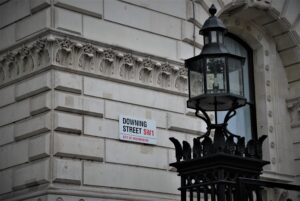
By Mert Kul, Politics Editor and History student at King’s College London
It is now just over 5 years since the former Labour MP for Bolsover Dennis Skinner was thrown out of the Commons for refusing to withdraw his now infamous ‘Dodgy Dave’ jibe at then Prime Minister David Cameron over his tax affairs. Yet in the midst of the escalating lobbying scandal involving Greensill Capital that has engulfed Whitehall and the former Cameron government, his words were perhaps more pertinent than even he could have imagined. By that time, it has now transpired that financier Lex Greensill had already been working for Cameron’s office as an unpaid advisor for almost four years, providing expertise on supply chain finance which allows small firms and employees advance loans for certain transactions. He was ultimately given access to eleven government departments. Under Cameron, Greensill worked to increase the role of supply chain finance in government contracts, including those between the NHS and pharmacies. It then emerged that the government’s former chief commercial officer Bill Crothers, responsible for government procurement worth £15bn per annum, was working as an advisor for Greensill Capital while still employed as a civil servant, reportedly helping to enmesh Greensill’s influence over public purchasing. The extent of Greensill’s involvement with Cameron and other civil servants was only brought to light after private messages were released revealing the lobbying operation carried out by Cameron for the firm over access to the current government’s business relief program.
His share options in the now failed lender, reportedly claimed by him to be worth $60 million, are now worthless. Yet this does not absolve Cameron, who appears to have shamelessly exploited the murky revolving door between government and business, the door he once prophetically labelled ‘the next big scandal’ and promised to address in his mission to ‘clean up politics’. Grand ambitions and equally grand failures to live up to them are not exclusive to Cameron alone, nor indeed is the hypocrisy of benefiting in private from the very thing you condemn in public. Yet, it is perhaps more damning in Cameron’s case given his track record of lofty evasiveness in the service of his own financial interests, often keeping within the letter of the law yet cynically indifferent to its spirit.
The Expenses Scandal of 2009 claimed many victims from shameless serial rule-breakers to trivial jokers who would claim for a Peperami. Yet Cameron was not one of them, his path to No 10 undisturbed. One of the central reasons for this lack of media scrutiny was that his claims were completely within the rules. It didn’t even matter that Cameron was making political cache out of criticising rules he had himself ruthlessly exploited. In a 2009 speech on cutting the cost of politics, Cameron condemned as ‘state sponsored propaganda’ the communications allowance, which allowed MPs to claim for the cost of websites and leaflets as long they publicised their work as MPs for their constituents. As he put it, “it’s there for every MP to pay for sending newspapers and leaflets to their constituents to tell them how great they are, what a brilliant job they’re doing and why they’re the best thing since sliced bread. It’s anti-democratic, it’s a waste of money, so it’s gone. And the best thing is, we’ll save the taxpayer £5m.”
He failed to mention that, in 2007-08, he himself claimed £1,656.76 for maintaining his website and £456.25 for advertisements in local Witney newsletters, where he served as MP. The hypocrisy was repeated when the full extent of MP’s expenses was revealed in 2009. On May 10th of that year, Cameron said, “we have to acknowledge just how bad this is. The public are really angry, and we have to start by saying, ‘Look, this system that we have, that we used, that we operated, that we took part in – it was wrong, and we are sorry about that.” Yet this remorse didn’t stop Cameron from, two days later, submitting a claim of £1,081 for mortgage interest on his Witney constituency home for that month. This was on top of the £82,450 he had claimed on his second home allowance over the previous 5 years, including £1,198.57 for the oil he used in his stove and utility bills averaging £180 a month. The question of why the Camerons, who among other things are heirs to a property portfolio worth £20m through his wife Samantha’s father, thought it was necessary to claim such expenses from people much poorer than themselves has remained characteristically unanswered.
Nevertheless, it wasn’t too long before Cameron found himself at the centre of yet another controversy with the release of the Panama Papers in 2015. After days of stalling and partial statements released by his office, he finally admitted to benefitting from an offshore tax haven trust fund arranged by this late father, Ian. Cameron sold the shares he had held from 1997 shortly before he became Prime Minister in 2010 at a profit of £19,000 “because (he) didn’t want anyone to say you have other agendas or vested interests.” This was only the fifth different explanation that he had given about the matter, first insisting it was private and therefore didn’t warrant an answer, then outright denying he had any offshore assets. This was later clarified by his spokesman who said he, his wife and his children did not benefit from an offshore fund, before the story was changed again to state that his family would not benefit from any assets in the future, skirting over potential earnings accrued in the past.
It is no crime to be wealthy, nor seek to conceal it. What matters far more is transparency over how one’s wealth is acquired and the interests that underpin it, especially when it comes to our elected and unelected officials. Without such open honesty, the public trust upon which our representative democracy is based will be fatally undermined. In the wake of this latest scandal, it is now up to David Cameron to go beyond his carefully crafted non-apology and bely his reputation, to restore faith in both him and public servants at large. It nonetheless remains to be seen whether he will explain his actions by giving evidence to the two inquires that have now sprung up in the wake of the revelations. I certainly wouldn’t bet my house on it.
Exclusive Offer: Get £100 off your Summer Internship Experience at Amplify Trading by clicking here or using our unique discount code at the checkout: MSAmplifySummer2021. Participants graduate from the course with a Diploma from the London Institute of Banking & Finance. For more information about the course, click here.

Contributor to The London Financial
We combine research produced by students and early professionals into a single website, breaking down the barriers to entry individuals face in a number of industries.
Contributor opinions are their own and do not necessarily reflect the stance of the LF.
